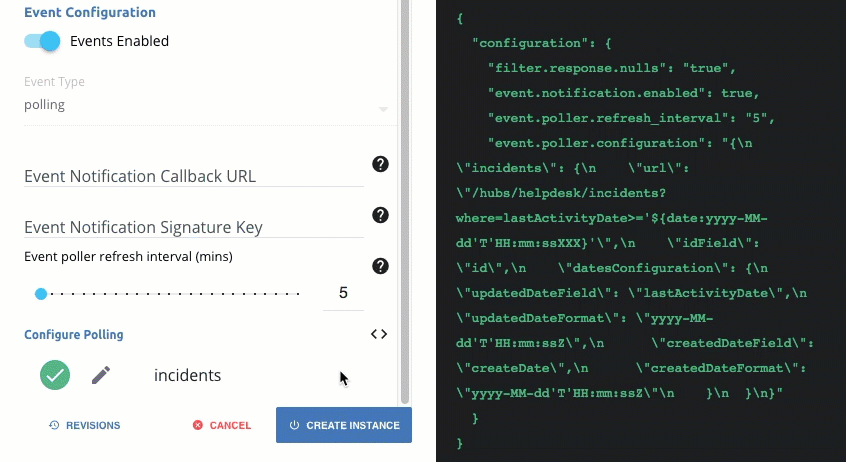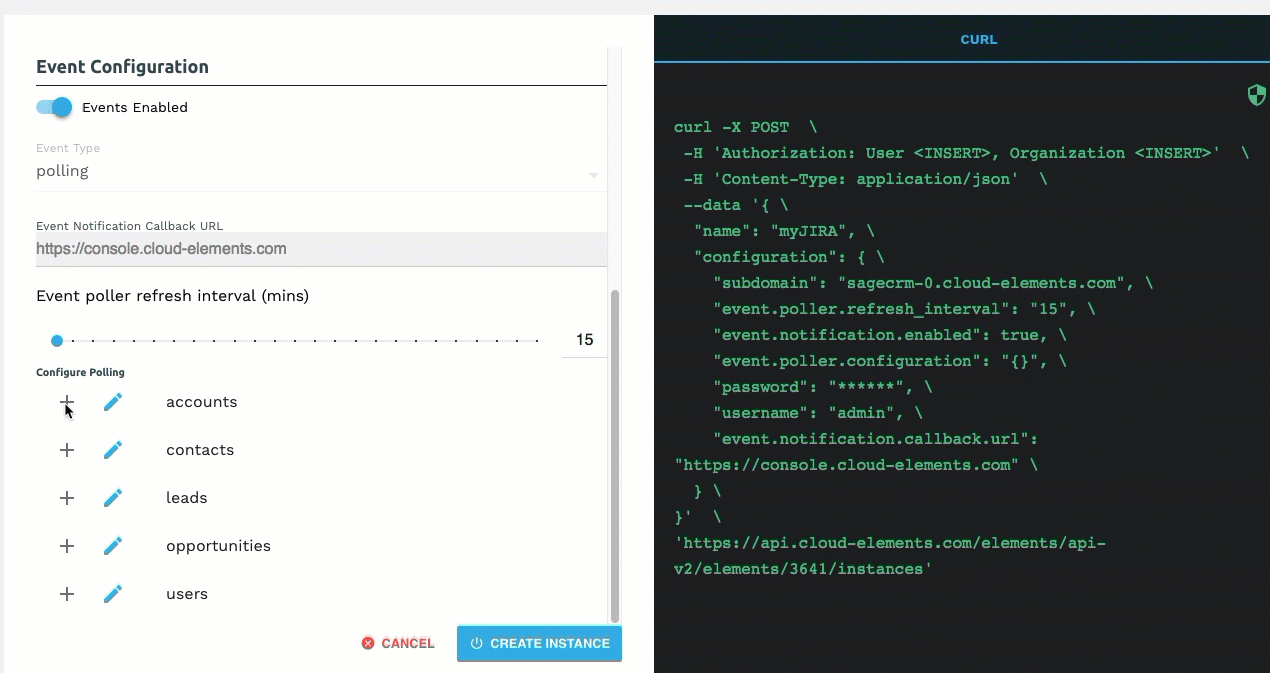Events
Cloud Elements supports events via polling or webhooks depending on the endpoint. If you would like to see more information on our Events framework, see the Event Management Guide.
Supported Events and Resources
Cloud Elements supports polling events for Sage CRM.
You can set up events for the following resources:
- accounts
- contacts
- leads
- opportunities
- users
created, updated, and deleted data through our API. Copy the configuration of one of the default resources, and replace the name with the resource that you want to poll. Polling
You can configure polling through the UI or in the JSON body of the /instances API call .
Configure Polling Through the UI
For more information about each field described here, see Parameters.
To authenticate an element instance with polling:
- Enter the basic information required to create an element instance as described in Authenticate with Sage CRM .
- Enable events: Switch Events Enabled on.

- Add an Event Notification Callback URL.
- Use the Event poller refresh interval (mins) slider or enter a number in minutes to specify how often Cloud Elements should poll for changes.
- Select the resources to poll.
Advanced users can further configure polling:
- Click
 to edit the polling configuration JSON directly.
to edit the polling configuration JSON directly.

- Click
 to access the poller configuration.
to access the poller configuration.

Note: If the time zones that you set up in Sage CRM are not UTC+00:00, make sure that you update the time zones in the poller configuration to match.- Click
Click Create Instance.
After successfully authenticating, we give you several options for next steps. Make requests using the API docs associated with the instance, map the instance to a virtual data resource, or use it in a formula template.
Configure Polling Through API
Use the /instances endpoint to authenticate with Sage CRM and create an element instance with polling enabled.
To authenticate an element instance with polling:
Construct a JSON body as shown below (see Parameters):
{ "element":{ "key":"sagecrm" }, "configuration":{ "subdomain": "sagecrm-0.<YOUR_TENANT>.com", "username": "<YOUR_USERNAME>", "password": "<YOUR_PASSWORD>", "event.notification.enabled": true, "event.notification.callback.url": "https://console.cloud-elements.com", "event.poller.refresh_interval": "15", "event.poller.configuration":{ "accounts": { "url": "/hubs/crm/accounts?where=Comp_UpdatedDate>'${gmtDate:yyyy-MM-dd'T'HH:mm:ss'Z'}'", "idField": "key", "datesConfiguration": { "updatedDateField": "Comp_UpdatedDate", "updatedDateFormat": "yyyy-MM-dd'T'HH:mm:ss'Z'", "updatedDateTimezone": "GMT", "createdDateField": "Comp_CreatedDate", "createdDateFormat": "yyyy-MM-dd'T'HH:mm:ss'Z'", "createdDateTimezone": "GMT" } }, "contacts": { "url": "/hubs/crm/contacts?where=Pers_UpdatedDate>'${gmtDate:yyyy-MM-dd'T'HH:mm:ss'Z'}'", "idField": "key", "datesConfiguration": { "updatedDateField": "Pers_UpdatedDate", "updatedDateFormat": "yyyy-MM-dd'T'HH:mm:ss'Z'", "updatedDateTimezone": "GMT", "createdDateField": "Pers_CreatedDate", "createdDateFormat": "yyyy-MM-dd'T'HH:mm:ss'Z'", "createdDateTimezone": "GMT" } }, "leads": { "url": "/hubs/crm/leads?where=Lead_UpdatedDate>'${gmtDate:yyyy-MM-dd'T'HH:mm:ss'Z'}'", "idField": "key", "datesConfiguration": { "updatedDateField": "Lead_UpdatedDate", "updatedDateFormat": "yyyy-MM-dd'T'HH:mm:ss'Z'", "updatedDateTimezone": "GMT", "createdDateField": "lead_createddate", "createdDateFormat": "yyyy-MM-dd'T'HH:mm:ss'Z'", "createdDateTimezone": "GMT" } }, "opportunities": { "url": "/hubs/crm/opportunities?where=Oppo_UpdatedDate>'${gmtDate:yyyy-MM-dd'T'HH:mm:ss'Z'}'", "idField": "key", "datesConfiguration": { "updatedDateField": "Oppo_UpdatedDate", "updatedDateFormat": "yyyy-MM-dd'T'HH:mm:ss'Z'", "updatedDateTimezone": "GMT", "createdDateField": "Oppo_CreatedDate", "createdDateFormat": "yyyy-MM-dd'T'HH:mm:ss'Z'", "createdDateTimezone": "GMT" } }, "users": { "url": "/hubs/crm/users?where=User_UpdatedDate>'${gmtDate:yyyy-MM-dd'T'HH:mm:ss'Z'}'", "idField": "key", "datesConfiguration": { "updatedDateField": "User_UpdatedDate", "updatedDateFormat": "yyyy-MM-dd'T'HH:mm:ss'Z'", "updatedDateTimezone": "GMT", "createdDateField": "User_CreatedDate", "createdDateFormat": "yyyy-MM-dd'T'HH:mm:ss'Z'", "createdDateTimezone": "GMT" } } } }, "tags":[ "<Add_Your_Tag>" ], "name":"<INSTANCE_NAME>" }Call the following, including the JSON body you constructed in the previous step:
POST /instancesNote: Make sure that you include the User and Organization keys in the header. See the Overview for details.Locate the
tokenandidin the response and save them for all future requests using the element instance.
Example JSON with Polling
instance JSON with polling events enabled:
{
"element": {
"key": "sagecrm"
},
"configuration": {
"subdomain": "sagecrm-0.cloud-elements.com",
"username": "xxxxx",
"password": "xxxxxxxxxxxxxxxxxxxxxx",
"event.notification.enabled": true,
"event.notification.callback.url": "https://console.cloud-elements.com",
"event.poller.refresh_interval": "15",
"event.poller.configuration":{
"accounts": {
"url": "/hubs/crm/accounts?where=Comp_UpdatedDate>'${gmtDate:yyyy-MM-dd'T'HH:mm:ss'Z'}'",
"idField": "key",
"datesConfiguration": {
"updatedDateField": "Comp_UpdatedDate",
"updatedDateFormat": "yyyy-MM-dd'T'HH:mm:ss'Z'",
"updatedDateTimezone": "GMT",
"createdDateField": "Comp_CreatedDate",
"createdDateFormat": "yyyy-MM-dd'T'HH:mm:ss'Z'",
"createdDateTimezone": "GMT"
}
},
"contacts": {
"url": "/hubs/crm/contacts?where=Pers_UpdatedDate>'${gmtDate:yyyy-MM-dd'T'HH:mm:ss'Z'}'",
"idField": "key",
"datesConfiguration": {
"updatedDateField": "Pers_UpdatedDate",
"updatedDateFormat": "yyyy-MM-dd'T'HH:mm:ss'Z'",
"updatedDateTimezone": "GMT",
"createdDateField": "Pers_CreatedDate",
"createdDateFormat": "yyyy-MM-dd'T'HH:mm:ss'Z'",
"createdDateTimezone": "GMT"
}
},
"leads": {
"url": "/hubs/crm/leads?where=Lead_UpdatedDate>'${gmtDate:yyyy-MM-dd'T'HH:mm:ss'Z'}'",
"idField": "key",
"datesConfiguration": {
"updatedDateField": "Lead_UpdatedDate",
"updatedDateFormat": "yyyy-MM-dd'T'HH:mm:ss'Z'",
"updatedDateTimezone": "GMT",
"createdDateField": "lead_createddate",
"createdDateFormat": "yyyy-MM-dd'T'HH:mm:ss'Z'",
"createdDateTimezone": "GMT"
}
},
"opportunities": {
"url": "/hubs/crm/opportunities?where=Oppo_UpdatedDate>'${gmtDate:yyyy-MM-dd'T'HH:mm:ss'Z'}'",
"idField": "key",
"datesConfiguration": {
"updatedDateField": "Oppo_UpdatedDate",
"updatedDateFormat": "yyyy-MM-dd'T'HH:mm:ss'Z'",
"updatedDateTimezone": "GMT",
"createdDateField": "Oppo_CreatedDate",
"createdDateFormat": "yyyy-MM-dd'T'HH:mm:ss'Z'",
"createdDateTimezone": "GMT"
}
},
"users": {
"url": "/hubs/crm/users?where=User_UpdatedDate>'${gmtDate:yyyy-MM-dd'T'HH:mm:ss'Z'}'",
"idField": "key",
"datesConfiguration": {
"updatedDateField": "User_UpdatedDate",
"updatedDateFormat": "yyyy-MM-dd'T'HH:mm:ss'Z'",
"updatedDateTimezone": "GMT",
"createdDateField": "User_CreatedDate",
"createdDateFormat": "yyyy-MM-dd'T'HH:mm:ss'Z'",
"createdDateTimezone": "GMT"
}
}
}
},
"tags": [
"Docs"
],
"name": "SageCRMPolling"
}
Parameters
API parameters not shown in Cloud Elements are in code formatting.
| Parameter | Description | Data Type |
|---|---|---|
| 'key' | The element key.sagecrm | string |
Namename |
The name for the element instance created during authentication. | string |
Subdomainsubdomain |
The subdomain portion of your Sage CRM URL, excluding HTTPS:// | string |
Usernameusername |
Your Sage CRM user name. | string |
Passwordpassword |
Your Sage CRM password. | string |
Events Enabled event.notification.enabled |
Optional. Identifies that events are enabled for the element instance.Default: false. |
boolean |
Event Notification Callback URLevent.notification.callback.url |
The URL where you want Cloud Elements to send the events. | string |
Event poller refresh interval (mins)event.poller.refresh_interval |
A number in minutes to identify how often the poller should check for changes. | number |
Configure Pollingevent.poller.configuration |
Optional*. Configuration parameters for polling. | JSON object |
| <resource name> (e.g., accounts, contacts, or lists) | The polling configuration of the resource. | JSON object |
<resource name>URLurl |
The url to query for updates to the resource. | String |
<resource name>ID FieldidField |
The field in the resource that is used to uniquely identify it. | String |
<resource name>Advanced FilteringdatesConfiguration |
Configuration parameters for dates in polling | JSON Object |
<resource name>Updated Date FieldupdatedDateField |
The field that identifies an updated object. | String |
<resource name>Updated Date FormatupdatedDateFormat |
The date format of the field that identifies an updated object. | String |
<resource name>Created Date FieldcreatedDateField |
The field that identifies a created object. | String |
<resource name>Created Date FormatcreatedDateFormat |
The date format of the field that identifies a created object. | String |
| tags | Optional. User-defined tags to further identify the instance. | string |